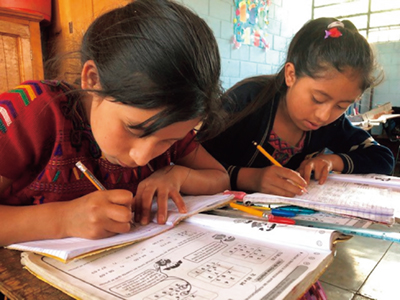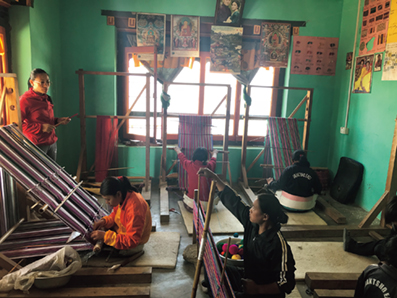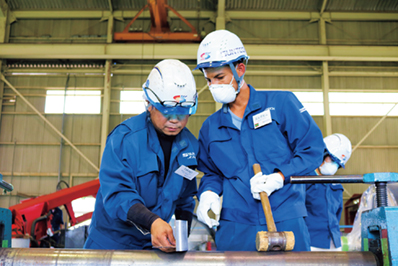2 Building the Future in 2019
At the G20 and TICAD7 hosted by Japan in 2019, the Government of Japan took a leading role by demonstrating its initiatives for realizing a sustainable society and development through education and human resources development for children and young people who will build our future society, as well as capacity building and innovation.
Investing in People, Building Institutions

Children studying math using the textbooks created with the support from Japan at a school in Nebaj, Quiché Department, Guatemala (Photo: JICA)
With regard to human capital investment, after discussions in the G20 Development Working Group (DWG) and other groups on the three pillars of quality education for achieving sustainable development and inclusive growth, education for creating innovation, and education for a resilient and inclusive future, the G20 Initiative on Human Capital Investment for Sustainable Development was endorsed at the G20 Osaka Summit. In addition, in order to contribute to the development of human capital through improvement of health conditions, the G20 Leaders had discussions to promote Universal Health Coverage (UHC) in developing countries, and for the first time in the G20, they discussed the response to aging society. Furthermore, the G20 Joint Session of Finance and Health Ministers was held for the first time by the G20, and there were discussions on how to enhance cooperation between finance and health authorities, as well as cooperation between the World Health Organization (WHO) and the World Bank toward promoting UHC in developing countries. This led to the affirmation of the G20’s commitment to the G20 Shared Understanding on the Importance of UHC Financing in Developing Countries.
At the opening session of TICAD7, Prime Minister Abe indicated the direction that the new TICAD would promote private sector activities and innovation. He underlined in his address that Japan would become the partner of dynamically developing Africa, through efforts including (1) Development of 3,000 industrial human resources over the next six years under the ABE Initiative 3.0, (2) Expansion of UHC including through improving access to primary health care and hygiene for three million people, as well as provision of quality education to three million children, and (3) Training of 60,000 people in the areas of justice, police, security management and others (see the related pages in Part II for details).
Promoting Innovation
At the G20 Osaka Summit, participants delivered their intentions to promote the realization of a free and open, inclusive and sustainable “human-centered future society,” and various initiatives were proposed to achieve this goal. Prime Minister Abe pointed out the importance of utilization of innovation to respond to urgent global environmental issues such as climate change, energy, and marine plastic litter, and stated that Japan would strive to put as much effort as possible into these areas to become a model for the world. He also announced that Japan launched the “MARINE Initiative” to provide support for developing countries’ efforts including their capacity-building and infrastructure development in the area of waste management toward the realization of the Osaka Blue Ocean Vision agreed upon by the G20 leaders, which aims to reduce additional pollution by marine plastic litter to zero by 2050 (see “ODA Topics”). In regard to advancing women’s empowerment, various initiatives were proposed such as the promotion of women’s participation in the workforce, support for girls’ and women’s education including improving access to quality primary and secondary education, and assistance for women entrepreneurs. Furthermore, it was recognized that science, technology and innovation (STI) is crucial for achieving the SDGs, and that the effective engagement of various stakeholders, including government, academia, research institutions, civil society, private sector and international organizations, is essential in unleashing the potential for STI. Thus, the Guiding Principles for the Development of Science, Technology, and Innovation for SDGs Roadmaps were endorsed at the Osaka Summit (see “(10) STI for SDGs” for details).
At TICAD7, Japan underscored support schemes such as the ABE Initiative 3.0 in order to promote the entry of Japanese companies into Africa and innovation and encourage Africa’s economic transformation (see the related pages in Part II for details). In addition, during the plenary session 2 on the first day, lively discussions were carried out under the theme of “Accelerating economic transformation and improving business environment through private sector development and innovation.” The main topics of discussion were on the following issues; encouraging diversification of industries utilizing technology, the blue economy, and innovation, promoting human resources development particularly for young people who will be the basis and driving force for economic development, promoting quality infrastructure, improving the investment environment and systems including governance, enhancing the added value of agriculture, further strengthening public-private dialogue between Japan and Africa to promote investment, and reaffirming the importance of peace, stability, and the rule of law, which underpin economic growth.

A weaving class at a vocational training center in Bhutan built through the “Project for the Construction of a Vocational Training Center and Hostel for Children and Youth with Disabilities in Kanglung, Trashigang” under the Grant Assistance for Grassroots Projects (GGP) scheme (April 2019)

A trainee from Africa interning at a Japanese company through the ABE Initiative (see “Stories from the Field” for details on a good practice of the ABE Initiative) (Photo: Sanyo Engineering & Construction Inc.)
